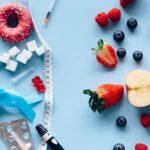Now Reading: Myth Busted: Do Detox Diets Really Cleanse Your Body
-
01
Myth Busted: Do Detox Diets Really Cleanse Your Body
Myth Busted: Do Detox Diets Really Cleanse Your Body

Imagine you’re in an enchanted cave, where glowing teal crystals shimmer with ancient energy and dripping stalactites hum a soothing melody. You’re holding a bottle labeled “Detox Elixir,” hoping it will wash away all the “toxins” in your body, leaving you renewed and radiant. It sounds magical, doesn’t it? But here’s the catch—what if your body doesn’t need a detox diet to cleanse itself? Detox diets, cleanses, and teas are all the rage in the wellness world, promising to flush out harmful toxins and reset your system. But do they really work, or are they just a glittering myth? Let’s uncover the truth with science and explore what really keeps your body clean and healthy.
What Are Detox Diets?
Detox diets come in many forms—juice cleanses, fasting regimens, herbal teas, or extreme diets that claim to “purify” your body. They often promise quick results like weight loss, clearer skin, more energy, or a “clean slate” for your health. The idea is that modern life exposes us to toxins (from pollution, processed foods, or stress) and that a detox diet can flush these out, leaving you feeling brand new. Some popular detox plans involve drinking only lemon water and cayenne pepper for days, sipping “cleansing” teas, or cutting out entire food groups to “reset” your system. It sounds like a mystical solution, but let’s dig deeper.
The Myth: Detox Diets Flush Out Toxins
The detox industry thrives on the idea that your body is full of harmful toxins that build up over time, and a special diet or product is the only way to get rid of them. Ads for detox teas or cleanses often show glowing, happy people, suggesting that a few days of sipping their product will make you feel the same. But is there any truth to this? Do we really need a detox diet to cleanse our bodies?
The Truth: Your Body Is Already a Detox Powerhouse
Here’s the reality—your body is designed to detoxify itself every single day, without any help from a juice cleanse or detox tea. You have a built-in team of organs working together to keep you clean and healthy:
- Liver: Your liver is like a master filter. It breaks down toxins (like alcohol, medications, or chemicals) into harmless substances that your body can eliminate. It also helps process waste from your blood.
- Kidneys: These filter your blood, removing waste and excess substances (like salt or urea) through urine. They also balance your body’s fluids and electrolytes.
- Lungs: Every time you exhale, your lungs help expel carbon dioxide, a waste product of breathing.
- Skin: Through sweat, your skin helps remove small amounts of waste, like salt and urea.
- Digestive System: Your intestines get rid of waste through bowel movements, ensuring nothing harmful sticks around.
This natural detox system is incredibly efficient. A 2015 review in the Journal of Human Nutrition and Dietetics found no compelling evidence that detox diets or cleanses remove toxins any better than your body already does. In fact, there’s little scientific proof that “toxins” build up in the way detox products claim—or that these diets target them specifically.
Why Detox Diets Don’t Work (And Can Even Harm You)
Not only are detox diets unnecessary, but they can also do more harm than good. Here’s why:
- They’re Often Too Restrictive: Many detox plans involve cutting out entire food groups or severely limiting calories. For example, a juice cleanse might have you drinking only fruit and veggie juices for days, which lacks protein, healthy fats, and fiber. This can lead to nutrient deficiencies, muscle loss, or fatigue.
- They Can Cause Dehydration: Some detox diets encourage drinking lots of water or tea (often with diuretics like dandelion root), which can lead to dehydration if you’re not careful. This might make you feel lightheaded or weak.
- They Lead to Rebound Weight Gain: If a detox diet helps you lose weight, it’s usually water weight or muscle mass—not fat. A 2017 study in Current Gastroenterology Reports noted that people often regain the weight (and sometimes more) after returning to normal eating, because these diets aren’t sustainable.
- They Might Disrupt Your Gut Health: Your gut needs fiber and a variety of foods to stay healthy. A juice cleanse or fasting detox can starve your gut bacteria, leading to bloating or digestive issues down the road.
What About the “Feel-Good” Effect?
Some people swear they feel amazing after a detox diet—more energy, less bloating, better focus. So what’s going on? It’s likely not the detox itself. When you do a cleanse, you might cut out processed foods, alcohol, or sugar, which can make you feel better simply because you’re eating less junk. Plus, the placebo effect is real—if you believe a detox will make you feel great, you might notice those benefits even if the diet isn’t doing much. But you don’t need a restrictive cleanse to get these results—just a balanced diet and healthy habits will do the trick.
How to Support Your Body’s Natural Detox System
Instead of relying on a detox diet, you can support your body’s built-in cleansing system with simple, sustainable habits. Think of this as giving your organs the tools they need to shine, like the glowing crystals in that enchanted cave.
- Eat a Balanced Diet: Focus on whole foods like fruits, veggies, whole grains, lean proteins, and healthy fats. These provide the nutrients your liver and kidneys need to function well. For example, cruciferous veggies like broccoli and kale support liver detoxification pathways.
- Stay Hydrated: Drinking enough water helps your kidneys flush out waste. Aim for 8-10 cups a day, adjusting based on your activity level and climate.
- Get Enough Sleep: Sleep is crucial for your body’s repair and detox processes. During sleep, your brain clears out waste products, and your liver works to process toxins. Aim for 7-9 hours a night.
- Limit Alcohol and Processed Foods: These can put extra strain on your liver. Cutting back on alcohol, sugary snacks, and processed meals gives your body a break.
- Move Your Body: Exercise boosts circulation and helps your lymphatic system (another detox helper) remove waste. A 20-minute walk or a gentle yoga session can make a difference.
The Real Path to Feeling Your Best
Detox diets might sound like a magical solution, but the truth is, your body doesn’t need them. You’re already equipped with an incredible system to keep yourself clean and healthy. Instead of chasing a quick fix, focus on habits that support your body long-term—eating well, staying hydrated, sleeping enough, and moving regularly. It’s like tending to the magic within you, letting your natural glow shine through without the need for a mythical elixir.
Take the First Step Today
Next time you’re tempted by a detox tea or cleanse, remember—you don’t need it. Try adding one healthy habit to your day instead, like sipping water with lemon or eating an extra serving of veggies. Your body will thank you for supporting its natural wisdom, no enchanted potion required!
Disclaimer: Always consult a healthcare professional for personalized health advice, especially if you’re considering a new diet or have specific medical concerns.
Stay Informed With the Latest & Most Important News
Previous Post
Next Post
-
 01Myth Busted: Do Detox Diets Really Cleanse Your Body
01Myth Busted: Do Detox Diets Really Cleanse Your Body -
 02Mastering Stress: Your Guide to a Calmer, Healthier Life
02Mastering Stress: Your Guide to a Calmer, Healthier Life -
 03Samsung Galaxy S25 Edge: Super Slim, Super Cool, But Is It For You?
03Samsung Galaxy S25 Edge: Super Slim, Super Cool, But Is It For You? -
 04Fuel Your Day: Nutrition Tips for Energy and Vitality
04Fuel Your Day: Nutrition Tips for Energy and Vitality -
 05Do Sugar Cravings Mean You Have Diabetes?
05Do Sugar Cravings Mean You Have Diabetes? -
 06Bollywood Beats: How Indian Cinema Shapes Global Pop Culture
06Bollywood Beats: How Indian Cinema Shapes Global Pop Culture



















